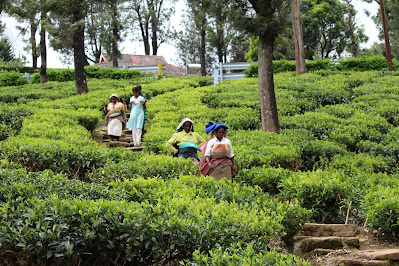EAFARMS - Farming With Heart💓:

🌾 Integrated Farm Management: A Holistic Path to Ethical, Regenerative Agriculture

Integrated Farm Management (IFM) is not just a method, it's a mindset. It harmonizes traditional wisdom with modern science to nurture soil, water, biodiversity, and community. Here's how IFM becomes a living system of care:
🧭 ORGANIZATION & PLANNING:
- Whole-farm vision: Align crops, livestock, water, and energy with ecological cycles.
- Zoning & mapping: Use permaculture principles to design efficient, regenerative layouts.
- Seasonal calendars: Integrate indigenous knowledge for sowing, harvesting, and rest cycles.
- Record-keeping: Track inputs, outputs, and soil health to guide ethical decisions.
🤝 COMMUNITY ENGAGEMENT

- Farmer cooperatives: Share tools, seeds, and surplus through trust-based networks.
- Local wisdom circles: Honor elders, women, and indigenous knowledge in decision-making.
- Youth & school gardens: Cultivate future stewards through hands-on learning.
- Transparent markets: Build trust with consumers through traceable, story-rich produce.
🌱 SOIL MANAGEMENT & FERTILITY

- ZBNF inputs: Use manure and natural ingredients to revive microbial life.
- Cover cropping & mulching: Protect topsoil, suppress weeds, and retain moisture.
- Compost & vermiculture: Turn waste into black gold, nutrient-rich, living soil.
- Minimal tillage: Preserve soil structure and carbon sinks.
🌳 LANDSCAPE & NATURE CONSERVATION

- Agroforestry: Integrate trees for shade, fodder, and carbon capture.
- Pollinator corridors: Plant native flowers and hedgerows to support bees and butterflies.
- Wetland buffers: Protect water bodies with vegetative zones.
- Sacred groves & spiritual spaces: Respect nature as a living temple.
🌾 INTEGRATED FARM MANAGEMENT

- Synergy over silos: Crops, animals, water, and energy systems work as one.
- Circular economy: Waste from one process feeds another—nothing is discarded.
- Ethical metrics: Measure success by soil health, biodiversity, and community well-being.
- Spiritual stewardship: Farm as a sacred duty, not just a livelihood.
🐛 CROP HEALTH & PROTECTION

- Botanical extracts: Use neem, garlic, and chili sprays for natural pest control.
- Trap crops & intercropping: Distract pests and confuse monoculture patterns.
- Beneficial insects: Encourage ladybugs, spiders, and wasps to balance ecosystems.
- Observation-based care: Walk the fields, listen to the land.
💧 WATER MANAGEMENT
- Rainwater harvesting: Store every drop through ponds, swales, and tanks.
Drip irrigation: Deliver water precisely, reduce evaporation.
- Mulching & shade: Minimize water loss and cool the soil.
- Watershed thinking: Manage water as a shared, sacred resource.
⚡ ENERGY EFFICIENCY

- Solar pumps & dryers: Replace diesel with clean, decentralized power.
- Biogas from dung: Fuel kitchens and reduce methane emissions.
- Human-scale tools: Prioritize low-energy, locally repairable equipment.
- Energy audits: Track and reduce your carbon footprint.
♻️ POLLUTION CONTROL & BY-PRODUCT MANAGEMENT

- Zero chemical inputs: Eliminate synthetic fertilizers and pesticides.
- On-farm recycling: Reuse greywater, compost, and crop residues.
- Eco-sanitation: Convert waste into safe, usable compost.
- Buffer zones: Prevent runoff into neighboring lands and water bodies.
🐄 ANIMAL HUSBANDRY
- Free-range ethics: Let animals graze, roam, and express natural behaviors.
- Integrated livestock: Use cow dung and urine for soil fertility and pest control.
- Ethnoveterinary care: Treat animals with herbs, oils, and traditional remedies.
- Respectful coexistence: Animals are partners, not machines.
🌿 Sustainable Agriculture – The Way Forward! 🌾
Without disturbing nature, cultivating and extracting agricultural products is the most appreciable method that is followed at EAFARMS, it supports:
✅ Health – Naturally grown foods are chemical-free and nutrient-rich.
✅ Environment – Protects soil, water, and biodiversity.
✅ Future Generations – Ensures fertile land and clean air for tomorrow.
✅ Balance with Nature – Encourages harmony rather than exploitation.
Agriculture should not be a war against nature. It should be a partnership with it.
Chemical-based agriculture prioritizes short-term yield, while regenerative agriculture restores long-term health for soil, farmers, consumers, and ecosystems.
Two Paths, Two Outcomes: Regenerative vs. Chemical Agriculture:
In today’s agricultural landscape, a critical divide exists between chemical-induced agriculture and regenerative agriculture. This divide isn’t just technical, it’s ethical, ecological, and deeply personal. As an environmental research scientist, I advocate for farming practices that honor the health of farmers, consumers, and the planet. Regenerative agriculture is not just an alternative, but a necessity.
The Chemical Agriculture Paradigm
Chemical-based agriculture, often called conventional farming, relies heavily on:
- Synthetic fertilizers and pesticides to boost yield and control pests.
- Monoculture cropping, which depletes soil biodiversity.
- Mechanized tilling, which disrupts soil structure and microbial life.
- Short-term productivity goals, often driven by market pressures.
While this model may offer immediate financial returns, it comes at a steep cost:
- Soil degradation and erosion.
- Water pollution from runoff.
- Health risks for farmers and consumers due to chemical exposure.
- Loss of biodiversity and ecosystem resilience.
Farmers, especially those under economic stress, may feel compelled to adopt these methods, believing they are the only path to survival. But this dependency can trap them in cycles of debt, declining soil fertility, and health hazards.
Regenerative Agriculture: A Healing Alternative
Regenerative agriculture flips the script. It’s not just sustainable - it is restorative. Key principles include:
- Cover cropping and crop rotation to enrich soil and prevent erosion.
- Composting and natural fertilizers to build organic matter.
- Minimal or no tillage, preserving soil structure and microbial life.
- Agroforestry and integrated livestock, enhancing biodiversity and carbon sequestration.
The benefits are profound:
- Improved soil health, increasing water retention and nutrient density.
- Reduced input costs, freeing farmers from chemical dependency.
- Healthier food, free from synthetic residues.
- Carbon drawdown, helping mitigate climate change.
Regenerative agriculture empowers farmers to be stewards of the land, not just producers. It aligns economic viability with ecological integrity.
A Toxicological Scientist’s Perspective: Health Beyond the Harvest
As someone who studies environmental systems, I see agriculture as a nexus of human and planetary health. Chemical-induced farming compromises this balance. It may feed bodies, but it starves ecosystems. Regenerative agriculture, by contrast, nourishes all layers of life, from microbes to mammals.
This isn’t just about farming. It’s about values.
Some thoughtful questions to ponder:
Do we prioritize profit over people? Yield over resilience? Convenience over conscience?
The Call to Action
Farmers deserve support, not just subsidies for chemicals, but education, tools, and markets for regenerative practices. Consumers deserve transparency and access to food that heals, not harms. And scientists, policymakers, and communities must collaborate to shift the narrative.
In this forum have written about food wastes needs to curbed rather than trying to produce more unhealthy food (quality vs quantity).
Cancer incidences have rose at unprecedented rate, diabetic levels are very high, endocrine disruptors have increased and hormones in body for both men and women have been altered so much. Land. Soil, Water, Climate - key components of agriculture and sustaining life has gone really bad with point of no return. If we still do not learn from history and moving forward this way - future generations will live with mandatory masks, drink only bottled water, wear Bio suits and take supplements to survive. And that kind of living will not be too far, humans are fast paced to achieve that.
Also, Monocropping negatively impacts small farmers through financial instability from crop failures and market fluctuations, environmental degradation leading to soil depletion and increased pests, and social issues like debt cycles and dispossession from land. It can trap farmers in a cycle of dependency on expensive seeds and chemicals, reducing profits and potentially leading to forced labor or land loss, while displacing them from land due to economies of scale enjoyed by larger, elite farmers.
Financial and economic effects Increased costs and lower profits:
Farmers become dependent on agribusiness vendors for specific seeds and agrochemicals, leading to higher costs and eroded profit margins.
Debt cycles:
High expenses on inputs like seeds and harvesting materials combined with low profits can lead to generational debt.
Vulnerability to market shifts:
Planting a single crop exposes farmers to significant risk if there are crop failures or unfavorable market circumstances.
Dispossession from land:
The economies of scale associated with monoculture favor larger landowners, potentially leading to the dispossession of smallholder farmers from their land.
Environmental effects
Soil degradation:
Growing the same crop repeatedly depletes specific soil nutrients, leading to reduced soil fertility and increased erosion.
Increased pests and diseases:
Monocultures create a prime environment for pests and diseases to spread rapidly, making crops more vulnerable and potentially leading to significant losses.
Increased reliance on chemicals:
To combat pests, farmers must use more chemical pesticides and fertilizers, further degrading the soil and ecosystem.
Social and livelihood effects - Reduced food and livelihood security:
Monocultures can shift focus away from diverse, sustainable food production, which is critical for long-term food security and livelihoods.
Disruption of traditional practices:
The emphasis on monoculture can diminish the complexity of landscapes and diverse land use practices that many smallholders rely on.
Forced labor:
The pressure to repay debts can lead to exploitative and coercive situations for farmers.
Displacement:
Larger farms that operate on a larger scale with high-yielding monocultures can displace small farmers who cannot compete with them.
🌍 Integrated Farm Management is a revolution in slow motion. It is rooted in love - for the land, for life, and for future generations. Whether you’re a farmer, policymaker, or conscious consumer, IFM invites and requests you to co-create a food system that heals.
Makesh Karuppiah, PhD









































